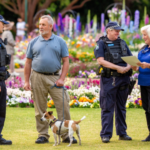AgForce Biosecurity Committee represented by its chair Belinda Callanan and Dr. Annie Ruttledge a member of the secretariat delivered a virtual training on biosecurity to the Gold Coast Rural Fire Brigade Group.
Biosecurity Training for the Gold Coast Rural Fire Brigade
The biosecurity training was organised through the initiative of Brett Bain, Group Officer of the fire brigade. He recognised that biosecurity is a collective responsibility and should be addressed by all.
The presentation centred on non-fire emergency activities of the RFS, covering the following key topics:
- Definition and significance of biosecurity, underlining its importance in preventing the spread of pests, diseases, and contaminants.
- Legislative requirements, notably the General Biosecurity Obligation (GBO) mandated by Queensland’s Biosecurity Act 2014, emphasise individual responsibility in preventing the spread of biosecurity risks.
- Farm biosecurity protocols, urging adherence to farm biosecurity plans and the importance of contacting landholders before entry, with emphasis on utilising contact numbers displayed on gates.
- Vehicle and personal hygiene maintenance, advocating the “come clean, go clean” principle, and encouraging the use of established tracks and roads to minimise contamination risks.
- Identification techniques for key weeds and pests prevalent in Southeast Queensland, including fire ants, with the provision of visual aids such as photos and videos for easy recognition.
- Guidelines on recognising symptoms of emergency animal diseases, along with procedures for reporting and strategies to prevent accidental spread, enhance community awareness and preparedness.
More biosecurity training is expected to happen in the future.
News source: AgForce



















